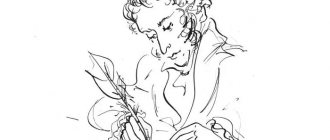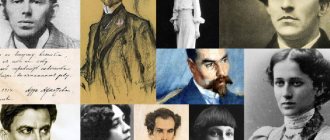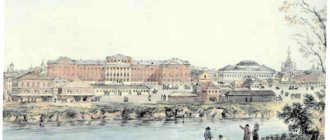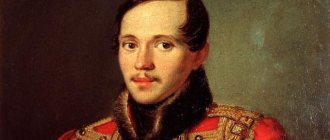Pushkin's relationship to poetry - essay
Pushkin expressed his attitude to poetry in the following poems: “Prophet”, “Poet”, “Conversation between a bookseller and a poet”, “Poet and the Crowd”, “To the Poet”, “Monument” and others. However, all these poems were written during different periods of Pushkin’s work. According to the periods, the attitude towards the topic of the poet and poetry also changed.
The lyceum period was characterized by the poet's search for his own path. This was expressed in imitation of Derzhavin, Batyushkov, and, especially, Zhukovsky. In the early poem “Town” we see the image of a chosen poet who “will soar to the sun and become above mortals.”
A similar image is reflected in the transitional poem “Licinia” of 1815. Pushkin portrays here a poet standing above earthly power, listening and serving only the truth.
The St. Petersburg period begins with Pushkin’s move to the capital, his entry into the circle of progressive youth and his passion for the ideas of future renewal and reorganization of Russia.
The poem “Village” of 1819, consisting of odic and elegiac parts, presents an understanding of poetry as work, but if at the beginning of the poem it is peaceful and happy work (“an unknown stream flows in my days in the bosom of happiness and oblivion”), then in the second part the character of the verse changes and becomes more rebellious.
Pushkin claims that the poet is obliged to “disturb hearts,” but regrets that this gift was given to him in insufficient quantities, which is why he cannot fully talk about the horrors of “skinny slavery.”
During the period of southern exile, Pushkin was overtaken by a passion for romanticism, which was a consequence not only of personal circumstances, but also of the general enthusiasm of the youth of that time for this direction, caused by disappointment in life and the state. In the poem “Conversation between a Bookseller and a Poet,” the poet recalls the time when he “wrote out of inspiration, not payment.”
He is sure that “the admiration of a fool” is not worth the labors of a poet; he prefers freedom to the admiration of the world and fees. To the poet’s arguments, the sophisticated bookseller replies: “Inspiration is not for sale, but you can sell a manuscript.”
At the end of the poem, the poet admits that the bookseller is right, but his words are written in prose, which abruptly transfers the reader from the world of the sublime to the mundane. The poem shows an attempt to comprehend not just poetic works, but an analysis of the image of inspiration, the relationship of talent and glory. Pushkin innovatively showed a realistic attitude towards poetic creativity.
In the poem “The Prophet” the author compares the poet with a prophet. Unlike other poems, where Pushkin used ancient images to talk about art and poetry, here the story of the biblical prophet Isaiah, who saw the Lord, is taken as a basis.
The lyrical hero of the work drags through the desert “tormented by spiritual thirst” and suddenly a seraphim appears before him - a messenger of God, who endows him with “the apple of the eye” and supernatural hearing.
However, despite the gifts, the poet remains a corpse lying in the desert and only God’s voice gives him a purpose in the name of which he lives and creates, which gives meaning to everything that he sensitively and accurately sees and feels.
Thus, we see that Pushkin sees the poet’s purpose in correctly using the gift given by God, “to burn the hearts of people with it,” to show the whole truth of life.
The purpose of a poet is to write
Creativity of A.S. Pushkin is the foundation on which the building of all Russian literature of the 19th and 20th centuries stands. Pushkin is not only an innovator in the field of style and the creator of the Russian language, but also the ideological inspirer of most of the writers who followed him.
The humanistic pathos of his work, the ideals of goodness and justice were the source from which, according to Dostoevsky, spoken fifty years after the poet’s death, all Russian literature drew inspiration and in which almost all the themes and ideas of its subsequent development were already outlined.
In the poet’s work, the theme of “the poet and poetry” is especially emphasized. This topic includes poems that set out the author’s views on the nature of the poetic gift, the poet’s purpose in this world, and his high mission.
The theme of the poet and poetry in Pushkin is multidimensional and includes several components. The first thing that characterizes the poet’s views is civic poetry, a continuation of the tradition of Radishchev and Ryleev, and an opposition to serfdom. The poet, according to Pushkin, is obliged to speak out against slavery in all its forms.
These ideas are reflected most clearly in the ode “Liberty” and the poem “To N.Ya. Pluskova." In them, the poet “sings of freedom to the world” and strives “to defeat vice on the thrones.” He is proud that he did not praise the “earthly gods”, that he “did not incense flattery” to the powerful of this world, that he “sang virtue on the throne” and that his “incorruptible voice” “was an echo of the Russian people.”
Freedom for Pushkin is one of the most important conditions for the poet’s creativity. However, this is not the freedom of the romantic personality from the norms and laws of society, not the unlimited freedom that consists in opposing oneself to the world. Freedom consists of consciously following your calling.
Characteristic in this regard is the poem “The Poet”, in which Pushkin compares two different states of the poet: the first - before inspiration visits him, and the second - after. In the first part, we are presented with the appearance of a completely ordinary person, “cowardly” immersed in the “cares of the vain world.” His “lyre” is silent, his soul “tastes a cold sleep.”
Pushkin places his hero even lower than other “insignificant children of the world.” However, in the second part a completely different picture appears before us. Awakened inspiration completely changes the poet's appearance.
His soul, like an eagle, awakens, he is no longer satisfied with the “fun of the world”, he is no longer interested in “human rumor”, he becomes “wild and harsh”, moves away from the world, “full of sounds and confusion”, in order to give vent to his inspiration and create Poetry.
However, despite this kind of description, Pushkin, unlike the romantics, does not consider the poetic gift as a merit of the individual, as a manifestation of the exclusivity of an individual. Individualism is alien to his philosophy. According to Pushkin, poetic talent is only a Divine gift, and the poet is a conductor of the “divine verb” in our world.
In this sense, the poet is a servant of God, and for him, at the moment of making the “sacred sacrifice,” only a “voice from above” sounds. For him, the rest of the world ceases to exist, the “people's idols” have no power over him. But this is not a stamp of “God’s chosenness” or some kind of exclusivity. A poet is only a person who has a more sensitive ear than other people.
Another poem by Pushkin, “The Prophet,” can serve as confirmation of what has been said and at the same time as its development.
The poem also consists of several parts. The first part describes the state of the “prophet” before “God’s voice called to him.” He, “tormented by spiritual thirst,” “languished in the dark desert.”
The second part describes his meeting with the messenger of God - the “six-winged seraphim”, who performs certain actions with him - he expresses himself as “a sinful tongue, and an idle one, and an evil one” and inserts in its place “the sting of a wise serpent.”
The Messenger of God gives the poet the ability to hear and feel what was previously inaccessible to him. His perception of the world changes, the poet becomes open to the world, feels an inextricable, limited connection with it.
Instead of a heart, a burning coal is placed in his chest, since only with a warm, caring heart should and can he speak the word of truth to people. In the third part, the poet hears “God’s voice,” which “calls” to him, urging him to “see” and “listen” and, “traversing the seas and lands, with a verb to burn the hearts of people.”
The poet's appearance and his inner essence change completely. His soul awakens, he is “filled with the will” of God. The poet, therefore, does not belong to himself, he is only a conductor through which God gives people beauty and harmony.
So, the theme of the poet and poetry is one of the central themes in Pushkin’s work. His understanding of the purpose of the poet and the essence of the poetic gift is deeply humanistic and associated with the concept of freedom.
A poet, according to Pushkin, is a person endowed with a more sensitive ear than others, who, amid the “noise of the vain world,” can hear the “voice of God” and tell the rest of the world about it.
The poem “The Poet and the Crowd” is also characteristic in this regard, where Pushkin shows his antipode - a poet who does not condescend to the people and understand their mood.
Pushkin contrasted romantic poetics, the philosophy of individualism, the tragic vision of the poet’s destiny and the fatal loneliness of the romantic hero with high humanism, based on the acceptance of the laws of existence, the idea of Divinity and the blessing of life in all its manifestations, and also elevated poetry to the great work of serving people.
Pushkin on poetry - essay with quotes
The theme of the poet and poetry was leading in the work of A.S. Pushkin throughout his life. While the ideals of freedom, creativity, inspiration and happiness of the poet changed, the theme of the poetic purpose of the poet and poetry in public life remained constant.
Already in the period of his early creativity, Pushkin, with a considerable amount of irony, expressed his opinion about his contemporary poets. The poem “Licinia” is indicative, which reflects the poet’s attitude to Russian reality and anticipates the political cycle of the St. Petersburg period. Here the image of a poet appears, standing above sinful earthly power, obedient only to the truth:
In righteous satire I will depict vice
And I will reveal the morals of their centuries to posterity.
Thus, at the moment of greatest irritation with injustice, pettiness of views and the pickiness of the majority of his critics, who did not understand the true tasks of literature, Pushkin, with all the clarity of poetic thought, hones in his work the theme of the purpose of the poet and poetry.
The poet, unable to follow the backward aesthetic views of his time, also did not want to meet the demands of the world, which saw in literature a means for moral teaching in the spirit of loyal morality.
In the poems “The Poet”, “The Poet and the Crowd”, “To the Poet”, Pushkin proclaims the idea of freedom and independence of the poet from the crowd, the mob, meaning by these words the secular mob, people deeply indifferent to true poetry. The call for the poet to “follow the free path” did not at all mean that Pushkin acted as a preacher of “art for art’s sake.” The point was different: the poet despised authors who write aimlessly.
A.S. Pushkin’s proclamation of the idea of freedom of the poet and his art was not caused by the fact that the poet really deprived poetry of a public role, separated art from public life, but by the fact that he wanted to preserve the independence of his talent from encroachments by the ruling circles and public opinion .
All the activities of the great poet, his views on the tasks of poetry speak of Pushkin’s defense of the idea of serving art, poetry, life, and society. The poet is called upon, like the prophet, to “burn the hearts of people with his verb.” Even in the ode “Liberty,” Pushkin formulated one of the poet’s main tasks:
I want to sing Freedom to the world,
... Smite vice on the thrones.
A realistic note subsequently sounds in the poem “Echo.” In it, the poet develops the idea that, like an echo, a poet in his work must reflect everything that happens in reality, especially in his homeland.
Of course, the most striking lyrical work reflecting the theme of the purpose of poetry is the poem “The Prophet”. Before us is a poet, tormented by thirst, who suddenly turns into a prophet.
The magical metamorphoses that happen to the poet turn him into the bearer of a great poetic idea. The newly acquired warmth of his heart forces him to preach truths known only to him. Reviving the hero, God gives him instructions:
And, bypassing the seas and lands,
... Burn the hearts of people with the verb.
Thus, Pushkin tells the reader about the poet’s chosenness by God, his special gift to see and notice the phenomena of life much more sensitively than those around him, comprehending what is happening around him more deeply and wisely. At the same time, the prophet is faced with the task of bringing the truth to the people, embodying it in poetry.
The poet repeatedly thinks about the question: do the people need these truths? Suddenly the poet understands that the seeds of providence are falling on barren soil. So the poet finds himself face to face with a hostile crowd that does not understand his poetic work.
It turns out that the people do not need freedom (“Freedom is a desert sower”), because they have only one heritage in their blood:
A yoke with rattles and a whip.
The same idea is heard in the poem “The Poet and the Crowd.” According to Pushkin, a poet unrecognized by the “cold crowd” should not value people’s love; on the contrary, his work is even more elevated to the status of being chosen:
You are the king: live alone. On the road to freedom
... Go wherever your free mind takes you.
In the poem “I erected a monument to myself not made by hands” by A.S. Pushkin sums up his work and substantiates his life and creative principles.
Only art, in the opinion of the great poet, can “survive the ashes and escape decay,” and its direct purpose is to awaken “good feelings” and to glorify freedom in a “cruel age.” It was these principles that Pushkin followed throughout his life.
The image of the poet and the theme of creativity in the lyrics of A. S. Pushkin
The image of the poet and the theme of creativity in the lyrics of A. S. Pushkin
Arise, prophet, and see and hear...
A. S. Pushkin
The image of the poet and the theme of creativity occupy a large place in the lyrics of Alexander Sergeevich Pushkin. Poetry was the main occupation of his life, so it is natural that Pushkin wanted to give an image of a poet, characterize poetic creativity, and talk about the role of poetry in the life of a poet and in the life of society. This theme is traditional; poets of different times have addressed it. In his works, Pushkin seems to be conducting a dialogue with his predecessors in world and Russian poetry: Horace, Ovid, Lomonosov, Derzhavin.
The theme of the poet and poetry runs through Pushkin’s entire work, receiving different interpretations, deepening over the years and reflecting changes in the poet’s worldview.
Already during the Lyceum period, in 1814, Pushkin created the poem “To a Friend the Poetmaker.” Addressing the aspiring poet, the young poet says that not everyone is given the gift of being a real poet: “An artist is not the one who knows how to weave rhymes.” The future genius of Russia speaks of the difficult fate in store for the poet:
The shack is underground, the attics are high -
Their palaces are magnificent, their halls are magnificent.
You should think carefully before entering the poetic field. Real poetry requires enormous spiritual dedication, which, moreover, is not often rewarded by people. It is much easier to turn to “worldly” concerns. “To be nice is good, to be calm is twice as good.”
In his poems devoted to the theme of the poet and poetry, Pushkin reflects on the place and purpose of poetry in society. In particular, in the 1824 poem “Conversation between a Bookseller and a Poet,” the poet and a representative of the “uninitiated” crowd, the bookseller, express their attitude toward poetry in a humorous tone in the form of a dialogue. The author's view of literature and poetry is somewhat down-to-earth. A new understanding of the tasks of poetry is emerging. On the one hand, the poet speaks of poetry that brings “fiery delight” to the soul. He makes himself stand out from the crowd. This is the image of a romantic who goes back into the past, remembers the time when “in the silence of labor”
I was not ready to share with the crowd of fiery delight.
“What does the world care?.. I’m a stranger to everyone!” - exclaims the poet. He chooses spiritual and poetic freedom. But the bookseller remarks:
Our age of trade; In this iron age, without money there is no freedom.
And it is true. A poet cannot exist without society. Both the bookseller and the poet are right in their own way: the laws of life have extended to the “sacred” area of poetry. The bookseller is smart enough to spare the poet's pride. And the poet is quite satisfied with the formula that the bookseller offers him: “You can’t sell inspiration, but you can sell a manuscript.”
The poet stands out from the crowd. The poet is the chosen one, but the chosen one comes through the torments of creativity, thanks to which the poet becomes a prophet. This idea is developed in the poem “The Prophet” and occupies an exceptional place in a number of poems devoted to the topic of the poet and poetry.
The poem “The Prophet” talks about the qualities that a poet must have, unlike an ordinary person, in order to fulfill his mission with dignity. It is characteristic that if in other poems Pushkin uses images of ancient mythology (Muse, Apollo, Parnassus), then in “The Prophet” the poet turns to biblical mythology: prophet, Jewish God, Seraphim. The future prophet languishes with “spiritual thirst” in the “dark desert” - in an inert, soulless human society. The Messenger of God Seraphim transforms the entire nature of man in order to make him a poet-prophet. The man's eyes open:
The prophetic eyes have opened,
Like a frightened eagle.
Now he sees what an ordinary person cannot see, hears the flight of angels and the growth of grass. Seraphim gives a person, instead of a tongue, “the sting of a wise snake,” instead of a tremulous heart, “he thrust a coal, blazing with fire, into his open chest.” But this transformation is not enough to become a real poet (“Like a corpse in the desert I lay”), you also need a high goal, a high idea, in the name of which the poet creates and which revives, gives meaning, content to everything that he so sensitively sees and hears. This goal is figuratively designated as the “voice of God,” calling to the prophet, as the will of God, filling his soul and commanding him to burn the hearts of people with his poetic word - a verb, showing the true truth of life:
Arise, prophet, and see and listen,
Be fulfilled by my will,
And, bypassing the seas and lands,
Burn the hearts of people with the verb.
In the poem “The Poet” the motive of the divine election of the poet also appears. Yes, the poet is a person like everyone else, he does not stand out from the secular crowd, he indulges in the fun and entertainment of the world:
Until Apollo demands the poet to the sacred sacrifice,
He is cowardly immersed in the worries of the vain world...
But inspiration descends, “the divine verb touches the sensitive ear,” it forces his soul to awaken. The poet becomes lonely, he feels chosen, vain amusements become alien to him:
He yearns for the amusements of the world,
People shun rumors...
The poet is internally independent.
In subsequent poems, Pushkin speaks with increasing confidence about the high purpose of the poet.
In such works as “The Poet and the Crowd”, “To the Poet”, “Echo” the author proclaims the idea of freedom and independence of the poet from the crowd, the “rabble”, meaning by this word “secular rabble”, people deeply indifferent to true poetry. The poet’s call to “follow the free path” does not at all mean that Pushkin is a preacher of “art for art’s sake.”
In the poem “The Poet and the Crowd,” Pushkin draws a sharp line between the poet and the crowd. The poet is alone among people, since the crowd is unable to understand his high aspirations:
The poet rattled the lyre with an inspired absent-minded hand.
He sang - and the cold and arrogant people all around, uninitiated, mindlessly listened to Him.
The crowd does not see any benefit in the poet’s work, because it does not bring any material benefits:
Like the wind, his song is free,
But like the wind she is ethereal -
What use is it to us?
This attitude of the “uninitiated” crowd causes the poet’s growing irritation. The poet does not accept this hostile world:
Go away - what does the peaceful Poet care about you!
In his poems, Pushkin defends realistic art related to the needs of social life.
In the poem “I erected a monument to myself not made by hands,” Pushkin, as it were, sums up his work. The author analyzes those qualities of his poetry that will make him “lovable” to the people. Pushkin's poetry is humane and fair; Throughout his entire work, the poet remains faithful to the ideal of freedom:
And for a long time I will be so kind to the people,
That I awakened good feelings with my lyre,
That in my cruel age I glorified freedom and called for mercy for the fallen.
Pushkin’s poetry is a kind of spiritual “miraculous” monument that will survive centuries. It is this monument that will become the subject of popular admiration: “The people’s path to it will not be overgrown,” because the entire work of the poet was dedicated to the ideal of spiritual freedom and independence.
Thus, the theme of the poet and poetry is the most important in the work of Alexander Sergeevich Pushkin. Throughout his life, the poet’s worldview changed, and in accordance with this, the theme of the poet and poetry underwent evolution, but always remaining true to the ideals of patriotism, high citizenship, and freedom.
Review
An essay about the image of a poet and the theme of creativity in the life of society and people consistently and correctly reveals the view of A. S. Pushkin on the role of the poet and poetry, who saw his destiny in what he expressed in the lines: “And my incorruptible voice was the echo of the Russian people.” . The parts of the essay are proportionate. The work is compositionally complete, distinguished by accuracy of word usage, variety of syntactic structures, and competent, appropriate citation.
The essay is written in the genre of a literary critical article in accordance with the requirements for the features of the genre.
The image of the poet and the theme of creativity in the lyrics of A. S. Pushkin
5 (100%) 1 vote
Searched on this page:
- the image of the poet in Pushkin's lyrics
- The theme of creativity in Pushkin's lyrics
- the image of the poet in Pushkin's works
- the theme of creativity in Pushkin's lyrics essay
- The theme of creativity in Pushkin's poetry
Save it to your wall!
The poet's theme in Pushkin's lyrics
Pushkin... How can one not remember the famous Alexander Sergeevich? This is the “sun of Russian poetry”, his works are so simple in sound that the soul asks to sing, but the poems are deep in understanding, because the thoughts expressed by the poet require analysis and reflection.
Pushkin was always interested in the theme of the poet and poetry, which is why it became dominant in his works. Alexander Sergeevich was tormented by questions about the purpose of a poet, about the intricacies of poetry.
During the period when the writer’s poems were just being reflected in literature, Pushkin expressed his own point of view about the poets who were his contemporaries. The alarming views and thoughts of Alexander Sergeevich are shown in his creation “Licinia”.
It is precisely this that expresses Pushkin’s actual attitude to Russian reality. A certain image of a poet appears, who stands on top of earthly power, which has many sins. And this hero obeys only the truth, it is the basis of everything for him.
The writer was always amazed by the injustice that reigned in the country, the misunderstanding of the authorities, and their reluctance to help people in need. He clearly understood that their views on life were too narrow and limited, they thought only about their desires, cared about their own interests.
And Pushkin, unable to put up with such ignorance, realized how important it is to reach everyone with the help of poetry, to open their eyes, to bring clarity to confused thoughts. The main task of the writer was to convey truth and truth to people when turning to poetry.
Thus, Alexander Sergeevich hones the poet’s theme in his own work. However, critics who decided to read his poems did not like the form in which Pushkin presented the content. What he writes, the way he writes it...
It is noteworthy that the poet did not succumb to the negative responses addressed to him, but continued, different from everyone else, to create in the form and in the direction that gave pleasure to Alexander Sergeevich!
The theme of freedom, the independence of the creator from the crowd, can be traced in Pushkin’s works. This is noticed in the poems “The Poet and the Crowd”, as well as in the famous “Poet”. The writer identifies residents who do not want to let something beautiful into their hearts: poetry. They are indifferent and indifferent to her.
Alexander Sergeevich called for appreciating and loving true creativity, and not turning to authors who write for money, that is, aimlessly. The writer says that it is important to “follow the free path,” because everyone decides for themselves what priorities should be set in life. It is interesting that Pushkin always tried to separate poetry from the public, since art and the illiterate crowd are simply incompatible concepts.
Pushkin saw himself in the service of poetry, art, that which brings sublime feelings into the hearts of people, enriches their souls, and makes everyone purer. His mission was to “burn the hearts of people with words.”
And the most stunning poem by Alexander Sergeevich is “The Prophet,” which clearly reflects the theme of the poet’s purpose. A thirsty hero appears before his eyes, who unexpectedly turns into a prophet, who is called upon to decide the destinies of people.
In Pushkin’s work there is an idea that a true poet is considered the chosen one of God! And in the poem the poet has a special task: to faithfully and faithfully bring the truth to the inhabitants, reflecting everything in unshakable poetry.
And in the last important creation, “I erected a monument to myself not made by hands,” Alexander Sergeevich puts an end to it, summing up his poetry. And, as it turned out, only art, according to Pushkin, is capable of substantiating creative and life positions and principles. This is how the great poet entered literature, illuminating the hearts and thoughts of people with his own works!
Essay on the topic: The image of the poet in the lyrics of M.Yu Lermontov
| Kind of work: | Composition |
| Date added: | 14.11.2020 |
- This type of work is not a scientific work, it is not a finished final qualifying work!
- This type of work is a finished result of processing, structuring and formatting collected information intended for use as a source of material for independent preparation of educational work.
If you have a hard time understanding this topic, write to me on WhatsApp, we’ll look into your topic, agree on a deadline, and I’ll help you!
If you want to learn how to write any essays yourself, then on the page “what is an essay and how to write it” I wrote in detail.
Look at similar essay topics, they might be useful to you:
Essay text:
Mikhail Yuryevich Lermontov is a poet whose works are mainly poetry on a patriotic theme. He writes poems about the Fatherland, imbued with love and compassion for his country. He worries about his own success in society against the backdrop of the suffering of ordinary people, and therefore in the poem “The Madman” Mikhail Lermontov says: “How dare I desire great fame when you are happy in the dust.” And partly he regrets his refusal to live a normal life. But with all his freedom of thought and love for man, the poet has a goal; he does not bend his “proud eyebrows” and makes poetry a powerful political weapon.
Under the influence of patriotic duty, he creates “Borodino” and “The Song of the Merchant Kalashnikov”, glorifies the heroic exploits of Russian soldiers, and says that every person, regardless of rank, has honor and dignity - and this is above any product.
Lermontov often writes that the poet is destined for a great destiny, and his high destiny is to convey to people the truth, sometimes bitter, to expose human vices, and not just to entertain the worldly nobility at merry feasts. Therefore, Lermontov glorifies Pushkin, an outstanding poet of the Silver Age. In his work “The Death of a Poet” he reflects the pride and honor of this great man, his love for the people and the ability to convey in rhyme compassion for simple peasants and serfs.
Lermontov blames Pushkin's death on the moral decline of society. “Freedom, genius and glory of the executioners,” he writes, realizing that the cause of the poet’s death was the licentiousness of the nobility, their low spirituality and degradation. Lermontov also dedicates his poem “The Prophet” to Pushkin, in which he says that a true poet feels happy only in complete harmony with the world around him and people who believe his word.
Mikhail Lermontov's civic poetry often intersects with his dedication to nature. In his landscape poem “When the meadows turn yellow...” the poet continues to reflect on the beauty of his homeland. His love and miracle for Russia is reflected in every line: here “the silver lily of the valley is hidden,” “cold spring plays in the ravine,” green forest whistles and scarlet plums in the garden.
Thus, native expanses heal the soul of the poet, mourning the decline of the Russian spirit and remaining in a foreign land, remembering his native fields, forests, rushing streams and clean morning dew on the leaves of the trees. And disappointed, but still bored, he writes: “Farewell, unwashed Russia, land of slaves, land of masters.”
With his sincere and deep poetry, Lermontov glorified Russian literature for centuries and became the most popular folk poet of his time, leaving a deep legacy of Russian literature to future generations.





